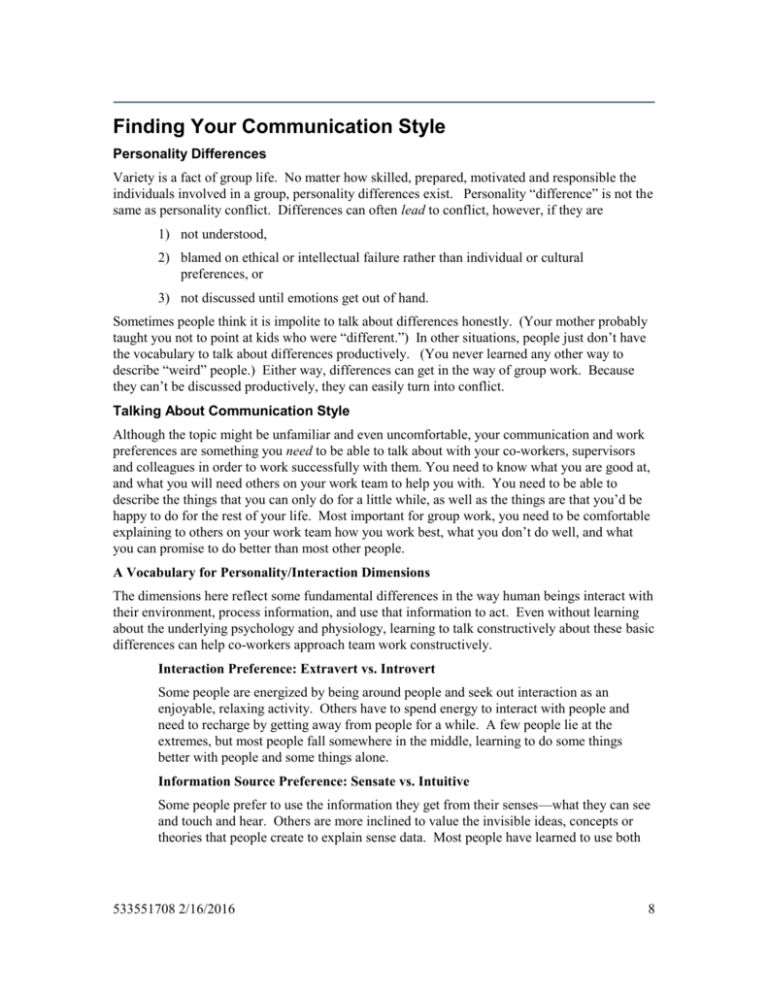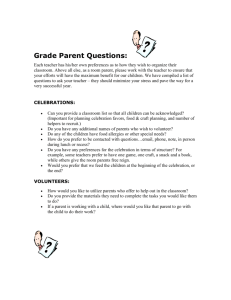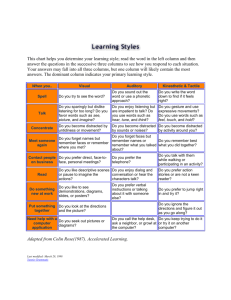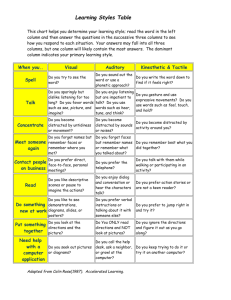Finding Your Communication Style
advertisement

Finding Your Communication Style Personality Differences Variety is a fact of group life. No matter how skilled, prepared, motivated and responsible the individuals involved in a group, personality differences exist. Personality “difference” is not the same as personality conflict. Differences can often lead to conflict, however, if they are 1) not understood, 2) blamed on ethical or intellectual failure rather than individual or cultural preferences, or 3) not discussed until emotions get out of hand. Sometimes people think it is impolite to talk about differences honestly. (Your mother probably taught you not to point at kids who were “different.”) In other situations, people just don’t have the vocabulary to talk about differences productively. (You never learned any other way to describe “weird” people.) Either way, differences can get in the way of group work. Because they can’t be discussed productively, they can easily turn into conflict. Talking About Communication Style Although the topic might be unfamiliar and even uncomfortable, your communication and work preferences are something you need to be able to talk about with your co-workers, supervisors and colleagues in order to work successfully with them. You need to know what you are good at, and what you will need others on your work team to help you with. You need to be able to describe the things that you can only do for a little while, as well as the things are that you’d be happy to do for the rest of your life. Most important for group work, you need to be comfortable explaining to others on your work team how you work best, what you don’t do well, and what you can promise to do better than most other people. A Vocabulary for Personality/Interaction Dimensions The dimensions here reflect some fundamental differences in the way human beings interact with their environment, process information, and use that information to act. Even without learning about the underlying psychology and physiology, learning to talk constructively about these basic differences can help co-workers approach team work constructively. Interaction Preference: Extravert vs. Introvert Some people are energized by being around people and seek out interaction as an enjoyable, relaxing activity. Others have to spend energy to interact with people and need to recharge by getting away from people for a while. A few people lie at the extremes, but most people fall somewhere in the middle, learning to do some things better with people and some things alone. Information Source Preference: Sensate vs. Intuitive Some people prefer to use the information they get from their senses—what they can see and touch and hear. Others are more inclined to value the invisible ideas, concepts or theories that people create to explain sense data. Most people have learned to use both 533551708 2/16/2016 8 kinds of information depending on the circumstances, but will tend to prefer one or the other if they have a choice. Problem Solving Style: Analytical vs. Global Regardless of where people get their information, they will have preferences about how they use it. Some people like to compare new information with other information, classifying it, defining it, looking for the ways in which one thing is different from another. Other people like to see how information fits together, seeing the whole pattern of all the pieces together and worrying less about what the individual bits look like. Most people can do either kind of information processing, but will find one way to be the “easiest” or most “natural” or most “productive” thing to try first. Decision Making Preference: Judger vs. Perceiver Before action can be taken, some sort of decision must be made with the information your brain has processed. Some people appreciate the sense of closure that a decision or action brings, and will make it as soon as possible. Others like to remain open to new information, new ideas or changes in the environment and prefer to delay a decision as long as possible. Action As a group, work through the next few pages. Each person should complete a survey individually, but spend some time comparing your answers and talking about how you feel about the various choices. There are no wrong answers. Everyone has the capacity to use a full range of behaviors, but over a lifetime of habit, practice and feedback, you will have learned to rely most of the time on a more limited set of behaviors. Often, people will realize that they would respond differently at work or at home. Or they would prefer to act one way in some situations, but find they are more comfortable doing the opposite at other times. If that’s the case, select the answers that are most comfortable for you at work. Once you have some information about your members, it is your responsibility as a group to develop procedures that take full advantage of your strengths, mitigate your weaknesses and achieve a working balance of diverse approaches. As you will discover, there are no bad personality styles. In fact, most complex jobs take all the capabilities of all possible human beings, so the ideal group has at least one of every style. In general, people should be assigned to do things that they do well. You also want to watch for places where one person is quite different from the rest of the group. You NEED that one person’s talents, but it’s easy for a lone voice to get “lost” in the conversations. When everyone else feels differently, sometimes it’s very hard to stand up for your own point of view. Don’t think the “majority” should always rule if that keeps your group from using all its resources. The GROUP should make a commitment to make sure to ask for everyone’s ideas, even though not everyone is comfortable speaking out. More important, if your group discovers it has an imbalance of styles, you will have some idea of where problems are most likely to occur. If you don’t find some way of making sure all the necessary problem-solving steps get taken care of, the result is usually something going wrong! Balancing Communication Styles Only a large organization can expect to have representatives of all interaction and information processing types, yet all types of information processing are needed for consistent success in 533551708 2/16/2016 9 complex tasks. In fact, people often cluster in professions with others who are like them. For example, an organization of engineers will tend to have a large number of Logical thinkers but very few Feelers to balance them. Thus, it is important to recognize when someone is missing. The Liberal Arts, in general, tend to have lots and lots of logical and theoretical thinkers, while the more active types gravitate toward business careers. The feelers might be out producing art rather than attending school at all. Learning to function well in a group involves learning how to balance all the strengths and corresponding weaknesses of different human beings. Communication is the means of doing that. So, the basic task of this project is to learn to talk about how human beings do things differently. In order to do that, you can use the vocabulary of this chart to talk about all the parts of getting a job done. You will need to understand how communication can be used to get those jobs done. Finally, you will need to develop skills to “play” the whole variety of roles needed to insure your group’s success. If you have only a few of one sort of people in your group, take good care of them (especially if they are introverted besides). As a group, you will want to 1. Balance group assignments to take advantage of natural interaction preferences as much as possible. Let the Introvert spend long hours in the library, or don’t make him come to every single meeting. Have the Extravert give the introduction and conclusion statements that have to be prepared at the last minute, but don’t expect her to accomplish long writing assignments between meetings. 2. Work together on complex tasks that require attention to both the big picture planning and the details of getting the job done. Very few people are equally good at both, and even if they can do both, they usually prefer one or the other. Thus, complex tasks are BETTER done by groups of people where both kinds of information sources can be utilized for maximum success. 533551708 2/16/2016 10 Interaction Styles For each pair, check the box that is most like you AT WORK. Talk first; think later. Sometimes don’t know what you think until you say it. Like to think about things before you talk about them, better yet, rehearse thoughts in private before talking at all. Know a lot of people. Like a lot of people. Have a ton of “close friends.” Enjoy private time to yourself; don’t like to be interrupted when doing something. Not distracted by reading with the TV on, or having a conversation while other people are doing the same. Either bothered by other people around, or have very well developed powers of concentration to avoid the distraction. Finds it easy to get into a conversation with people, even total strangers. Perceived by others as “a great listener” or “shy” or “stand-offish.” Telephone calls are welcome interruptions. Like to have people just drop by to say hi. Can’t get anything done unless you protect yourself from interruptions. Enjoy going to meetings, parties, . . . anywhere there are people around to talk to. Would rather have a very few close friends over than to go to a large party. Prefer brainstorming ideas in a group to doing it alone. Might not even think up ideas when alone. Get “bored” or “tired ” when alone and lose interest and energy for activities in general. “Can’t think” when there are a lot of people around. Most creative alone in a quiet place and the farther from people the better. Would go to a party to cheer yourself up. Would need to be alone to relax after a party. If you have more checks in the first column, you are more Extraverted. If you have more checks in the second column, you are more Introverted. 533551708 2/16/2016 11 Preferred Information Sources For each pair, check the box that is most like you AT WORK. Like specific answers to specific questions. If you ask what time it is, you’d rather hear “10:05” than “a little after ten.” Annoyed by people who are too fussy about details. Would rather just get the general drift of things and then move on to something else. Like to concentrate on the here and now, what you see and hear around you. You’d pay more attention to the football plays than to the “importance” of the game. Like to understand the meaning, the essence, the underlying importance of a thing, even if you don’t take the time to worry about all the details. You can enjoy an important game without knowing a thing about football! Like to see tangible effects, not hypothetical cases. You’d rather get out on a picket line than think up a winning court argument. You like to dig for the relationships and connections behind the events. You’d rather figure out the pattern of the crime than go catch the crook. In general, if it ain’t broke, don’t fix it. In general, there’s always room for improvement. Would rather work with facts and figures than ideas and theories (and chances are, you’re good at facts and figures, too). Facts and figures bore you, but you could theorize for hours (and you might even be considered a creative thinker.) You don’t see much point in dreaming about the future, or making plans for “someday” when there’s so much to be doing right now. Planning the event, project, or semester is a whole lot more fun than buying the food, painting the cupboard or taking the classes. You’d rather have clear instructions and follow them step by step, than be expected to follow vague guidelines or unfinished, incomplete plans. You hate it when people give you all the steps to a job, as though they didn’t think you could figure it out for yourself. “Seeing is believing.” Nothing should be taken at face value. The real meaning lies beyond what can be seen on the surface. You tend to take things literally and probably prefer to say exactly what you mean, without a lot of fancy words. or empty talk. You are probably good at language, perhaps enjoying poetry, word games, or writing. You’d rather focus on your own task and let someone else worry about the big picture or the long range. You’d rather do the planning, and even the worrying about the future, and have someone else deal with the nitty gritty details. If you have more checks in the first column, you are more Sensing. If you have more checks in the second column, you are more Intuitive. 533551708 2/16/2016 12 Processing Preferences For each pair, check the box that is most like you AT WORK. You find it easy to separate parts of your life, leaving aside “personal” problems to concentrate on your studies, or putting class work out of your mind while you are on a date. All parts of your life must be “in sync” before you can feel relaxed. It would be better to have a subdued quiet date when school is getting you down than to “pretend” everything is fine and party anyway. You might be described as “unemotional” or “uninvolved” but also “sensible” or “a careful thinker.” You might be described as “over sensitive” or “impressionable” but also “empathetic” or “caring.” You like to make decisions based on careful rules, distinctions between things or logical analysis. Ethical decisions should be based on laws, personal decisions on a consideration of the facts, and business decisions on careful financial analysis. You like to make decisions based on your sense of the overall situation, even if you can’t quite put your finger on exactly what it is that gives you that sense. It would be silly to make a choice that didn’t “feel right” even though the facts seemed to point that way. Understanding the arguments on either side of a question, or carefully critiquing every aspect of an argument for or against an issue, is the only way to really make a good decision. You want to know EXACTLY why someone thought the movie was good or bad. No amount of discussion can ever really solve a problem. At some point, you just have to balance all the various points of view and do what everyone is most comfortable with. Even if a person thought they knew what they liked about a movie, they couldn’t ever describe the whole experience. Being clear is more important than being appreciated and you think it’s worth the effort to know exactly where other people stand on an issue. Getting all the details “on the table” can get in the way of the real issues. Being a little ambiguous is sometimes the best way to get things out in the open. You like to get at the “heart” of things, discarding or ignoring irrelevant information, details, or topics that don’t help you decide. You like to get a feel for the whole situation before making any decisions and focusing on just a few details doesn’t tell you much. You have little patience with people who can’t explain exactly how they’ve come to a decision; they probably don’t really know what they think. You’re suspicious of those who think every decision has to be make for a specific reason; most of the time the world is just too complicated to completely explain. More likely to believe in the scientific answer than in what people think. More likely to think people have more sense than science can explain. If you have more checks in the first column, you are more Analytical. If you have more checks in the second column, you are more Global. 533551708 2/16/2016 13 Decision Making Preference For each pair, check the box that is most like you AT WORK. You like to have a place for everything, and to keep everything in its place. You’re always willing to try a new path, a new way, a new source of information. There are never too many new ideas. The world would be a better place if people would just get it together and do what they need to do. You’re flexible, willing to change your plans, always open to a last-minute option . . . and like to be ready to take advantage of them. You like to start the day with a pretty clear plan of what you will be doing. An over-planned day makes you crazy . . . and you probably wouldn’t make it to half those appointments anyway, since something else always seems to come up. Checklists, calendars, and filing systems are the tools for success. Too much organization gets in the way of living life. There is more satisfaction in dealing with the things life brings you than in trying to control every aspect of it. One you’ve made plans, you resent changing them. Sometimes it’s even more comfortable to go to the unexciting place you said you would than to do something fun on the spur of the moment. The most fun is found in spontaneous, spur of the moment activities. You’re a good time manager and when you set a deadline for yourself, you generally don’t have problems sticking with it. Procrastination is your middle name, if only because there is always so much new stuff coming along to do right away. It makes you nervous when you know you will have to do something but can’t find out exactly when. You hate being pinned down, having to make decisions too soon, or come to conclusions without considering all the options. You’d prefer a yes or no answer to a maybe, even if the decision is not in your favor. No answer is ever final. There can always be new information or priorities that can give people reasons to change their minds. If you have more checks in the first column, you are more Judger. If you have more checks in the second column, you are more Perceiver. 533551708 2/16/2016 14 Communication Styles Now plot your results from the Interaction and Decision Making preferences to find your interaction style. This is a composite of the characteristics that determine how you habitually interact with other people. Judger Perceiver Extravert Introvert Energizer Scheduler Likes to get to a decision and likes to be around people to do it. The combination is often perceived as being a “natural leader.” Your ideas might not always be the best ones (so you need to be sure you’re not energizing right over someone else’s thoughts) but at least you are willing to “take the bull by the horns” and get a group going in a direction. Be careful that you don’t let your urge to go in ANY direction, so long as you have a plan, get in the way, but you can be an invaluable “selfstarter” to get a group moving. You might be the person who never says a word, and then suddenly summarizes everything everyone else has said with the obvious conclusion. Or, perhaps you are the person who keeps the calendar of meeting times . . . including how long each meeting is expected to last. Of course, you might become impatient and agitated if the meetings go on longer than planned, but at least you bring a sense of order to the proceedings. Don’t expect to be the person to get the meeting going, but you might be the one who leads it to a productive conclusion. Brainstormer Listener Likes to have people around and is always looking for a new perspective, another opinion, a fresh idea from them. Could probably talk for hours and hours and hours about whatever came up. Might not have any particular urge to get to a point. Might even avoid coming to a conclusion if it means the meeting will have to end. Be willing to set limits on the time you spend on exploratory talk, but you are the person to see that everyone’s ideas do get explored before a decision is made. Others might think you have nothing to contribute, but you are the one who thinks about the implications of what people say. You don’t just hear people, you relate what they say to how you think about the world. Your tendency might be to keep all that insight to yourself, but if others give you a bit of quiet space they will find some of the best ideas come from your direction. 533551708 2/16/2016 15 Information Processing Style Now plot the results from the information sources and problem solving lists to find your information processing styles. This describes the way each person likes to “think” about things and influences what each prefers to communicate about. Analytical Global Sensor Intuitive Logical Theorizer Oriented toward facts, tangible evidence, the here and now. You like to see a step by step procedure toward a realistic, definable goal. You will be motivated by tangible rewards and you will enjoy the sense of accomplishment that comes from tackling the steps of a project in an organized way. These “detail” people are crucial for making sure everything has been covered and that the final presentation is polished BUT they can drive everyone else crazy when they insist on asking one more question, or on doing things exactly right. Chances are people think of you as “brainy.” You like to look at the big picture, but you are willing to analyze it into manageable pieces. You’d rather talk about ideas than about action, but you’re good at “reverse engineering” a situation to figure out what plan of action might make sense. These “big thinkers” are goal oriented and willing to focus on the overall concept or purpose BUT they can be bored and impatient with the step by step process of getting work done. Active Feeler You’d rather be doing than thinking, and you don’t like to spend a lot of time second-guessing what you are doing. You like to be recognized for your effort and you will gladly march all day for the sake of an appreciative group. These “pragmatic” types recognize limitations and ask important workability questions BUT might be impatient with the whole academic insistence on getting at the underlying meaning of everything. Sometimes it’s hard for you to explain why you believe what you believe; things sometimes come to you in flashes of inspiration. You might seem to have a “sixth sense,” especially where people or animals are concerned. You like to know you’ve had an impact in other people’s lives and you might be accused of catering to others’ desires. These “creative” types provide ideas that get the committee going BUT not all ideas are workable and the creative person might not do well as a synthesizer or analyzer of workability. 533551708 2/16/2016 16 Group Composite To a certain extent, your group’s behavior is a composite of its individual members’ styles. As you work through this analysis, you should become familiar with each other’s preferences and habits. The idea is not to all be alike. In fact, the more differences there are, the better prepared you are to cope with the variety of things you’ll need to do to complete your project. You simply want to become familiar with each other’s thinking and communication styles so that there aren’t too many surprises or misunderstandings as the project gets under way. Find each individual’s communication and information processing style and write his or her name in the appropriate box. Communication Energizers Schedulers Brainstormers Listeners Information Processing Logicals Theorizers Actives Feelers Look for holes and clusters that indicate the group that is unbalanced in some way. This is common to find in work groups because people who have similar personalities often select similar careers. Most projects require a team to use the full range of human behaviors, however, so you need to know if your team is starting off with any deficiencies. Do all your group members cluster in a single area of the map? What types of communication, thinking or decision-making is your group lacking? How can you make sure that your group does BOTH analytical and global thinking? How can you make sure that your group is BOTH decisive and flexible? 533551708 2/16/2016 17








